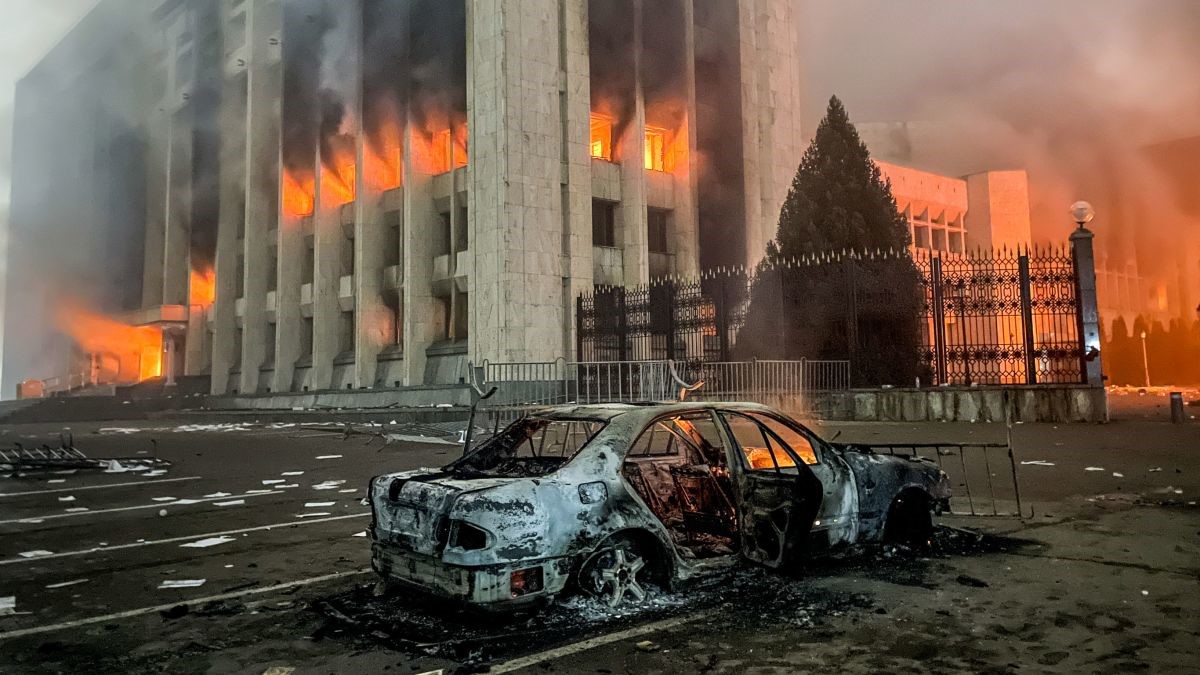
For ten days in early January 2022, Kazakhstan was on the brink of civil war. Spontaneous demonstrations over rising fuel costs escalated into urban guerrilla warfare and a military invasion by the armies of neighbouring countries allied to Russia. When they left, after 30 years of absolute power, the family of former president Nursultan Nazarbayev disappeared from the surface.
A new government, extremely welcome to Moscow, arrived and new military, police and intelligence leaders were elected. Constitutional reforms and a new economic policy strategy were announced, the aim of which is to extend welfare to the entire population as far as possible. In less than twenty days, an invisible coup d’état took place, without political assassinations, and with many smiles – Kazakhstan is a very special world, with its own rules and culture, and should be learned and understood, not judged.
The land of free men. This is what Kazakhstan means, named after the name given by the Turks to the people of a nation as large as a continent – a name accepted by all, because the peoples of Persia (now Iran) have always feared and respected it[1]. Even the Chinese, who after the years of Genghis Khan’s empire (which extended to the whole region) used Kazakhstan as a main route to Europe and became part of the local ethnic groups[2]. Despite being half the size of the European Union, less than 20 million people[3] live there, a tenth of whom live in Almaty[4] which, until 1997, was the capital[5], until the dictator Nursultan Nazarabyev changed the name of Astana to Nur-Sultan and moved the offices to the city he dedicated to himself[6], spending insane amounts of money on roads, monuments, sporting and cultural events, and even training a new class of judges, inviting British judges to handle civil cases and arbitrations[7].
The whole dictatorship is aimed at making as much money as possible. From 2000 to 2050, for example, the city of Baikonur was leased to Russia for 115 million dollars a year[8], turning it into a free port and tax haven[9] and – more importantly – as a military and launch base for the Russian space programme[10]. During the years of the Soviet Union, Baikonur was a forbidden city, which could only be entered with special permits[11], and it is still, as then, the largest space base on the planet[12].
In order to make the economy stronger (and more independent from Russia), the regime supports the return home of the hundreds of thousands of Kazakhs who, over the last two centuries, have moved to China[13]. An operation that succeeds with difficulty, because those who return only speak Chinese and a little Russian, and have great difficulty with the Kazakh language, which uses Arabic characters[14] and, therefore, only find work in Chinese companies[15].
In the new China, people of Kazakh origin have a hard time – they are despised[16], considered terrorists and[17], if they are Muslim, openly persecuted[18]. According to the UN, since 2017 China has imprisoned more than a million Uyghurs, Kazakhs and other Muslims from Xinjiang in concentration camps[19] that Beijing calls “vocational training and re-education centres”[20]. The European Union protested, but nothing changed[21].
The transition from USSR to dictatorship
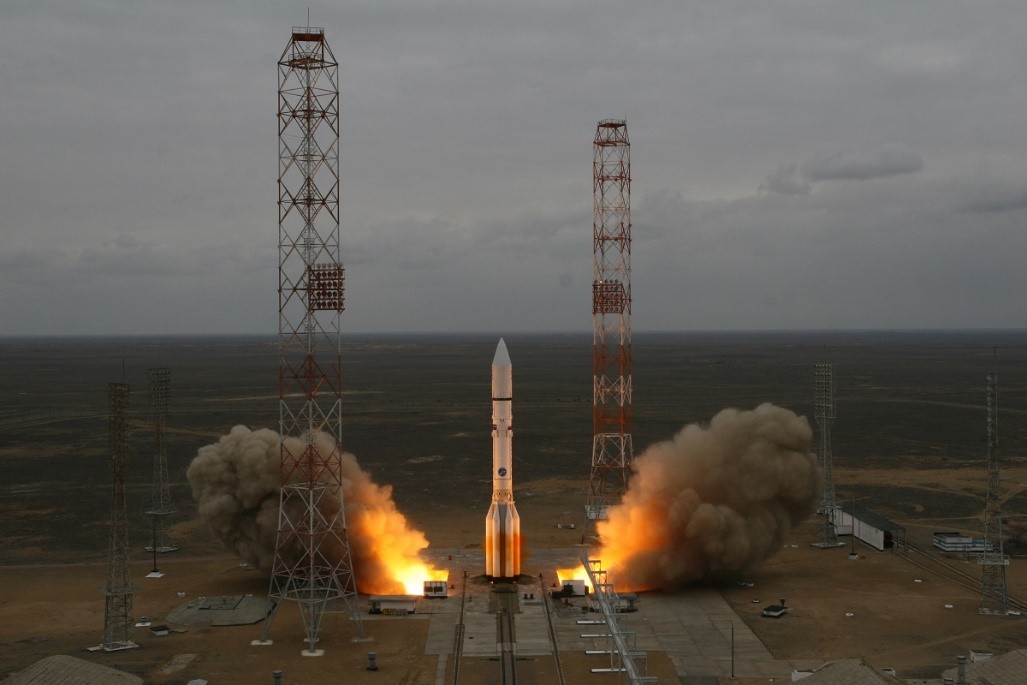
A Soyuz rocket leaving the Baikonur space base[22]
Kazakhstan was the last state to declare independence from Russia (1991), but it was the one that most radically pursued a policy of privatising the national economy: more than 10,000 in the very early years, almost all of which were sold for pennies to members of dictator Nazarbayev’s clan – or to foreign multinationals, as Mikhail Dorofeyev, former public relations director of KazMunaiGaz, explains: “We offered oil to the West in exchange for technology, know-how and money”[23]. Thanks to extremely low taxation, more than 40 billion dollars of foreign investment has arrived in Kazakhstan since 1993[24].
The operation is a success: in 2006 Kazakhstan alone produced 60% of the entire GDP of Central Asia – the state is stable, modern, religiously tolerant[25]. Of course, the press is gagged, critics of the regime are arrested or murdered, elections are sham[26] and corruption is rampant[27], but this does not matter to investors. Kazakhstan has a bicameral parliament consisting of the Majilis and the Senate[28], and from 1991 to 2019 it was led by Nazarbayev[29], who was then succeeded by his protégé Kassym-Zhomart Tokayev.[30]
As a result, Kazakhstan was the first ex-Soviet republic to repay all its debt to the International Monetary Fund, seven years ahead of schedule, and was the third most dynamic economy in the world after China and Qatar[31]. Income from the balance of trade was used to recapitalise banks ($4 billion), support the real estate and agricultural markets, and promote small and medium-sized enterprises – all to the tune of $21 billion (about 20% of GDP)[32].
Nursultan Nazarbayev’s cult of personality exceeds the limits of the ridiculous – starting with the fact that he has chosen his own nickname, Yelbasy (father of the fatherland), and that he has named streets and squares after himself in all the cities[33]. He came from a peasant family and joined the Communist Party of the USSR at the age of 20, making a meteoric career for himself[34]. For this reason, at the time of independence, he had the strength to impose himself, and then no one has ever tried to oust him from the throne[35]: also because the most powerful clans are happy to get rich in his shadow[36], and the continuous constitutional reforms have made it almost impossible for candidates to run against him[37]. In June 2010 he was granted total immunity, which was then extended to all his family’s businesses[38].
Nursultan Abishevich Nazarbayev has three daughters. The eldest, Dariga, was born in 1963 and is a deputy in the Majilis; the second, Dinara (1967), runs the Nursultan Nazarbayev Education Foundation (she was born in 1967)[39]. Both have married influential state officials, and their families are very wealthy: Dariga married General Rakhat Aliev and, after a divorce (2007), was good friends with his partner, the fugitive Mukhtar Ablyazov, who ‘betrayed’ the family[40]. Dinara married Timur Kulibayev (still the richest man in Kazakhstan)[41], who had always been close friends with the banker Karim Masimov – former prime minister and former chairman of the National Security Committee[42]. Masimov and his deputy Anuar Sadykulov were arrested on 8 January 2022[43], after the riots in Almaty, on charges of using their position to illegally enrich themselves and establish an alternative political power to that of parliament[44].
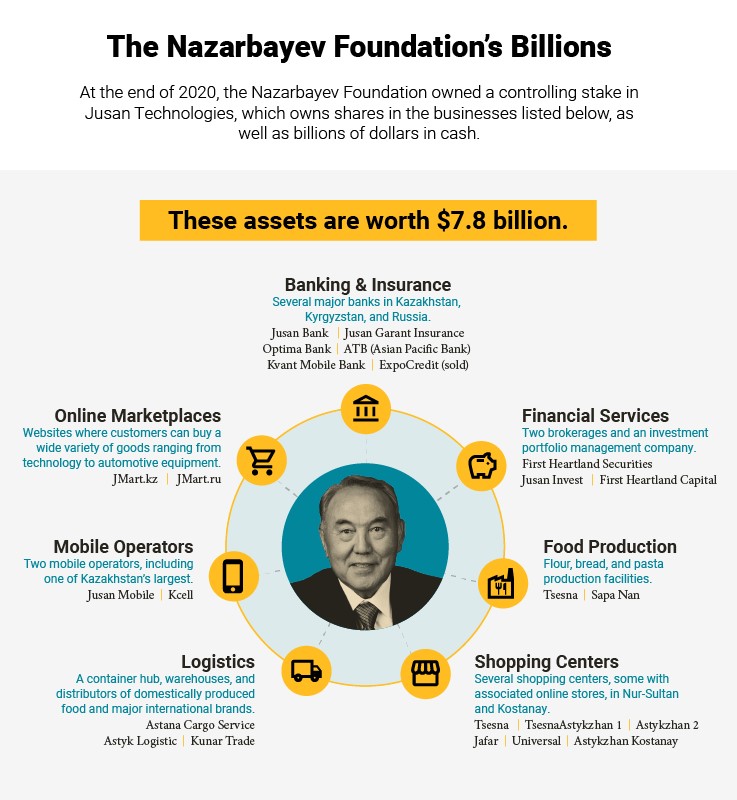
The wealth accumulated by Nazarbayev and his family during his years at the helm of Kazakhstan[45]
General Aliev, the father of three children from Dariga[46], had a fight with his father-in-law and fled abroad, where he wrote an autobiography entitled ‘The Godson’[47]., in which he says of his father-in-law. “This book is about a man who stole billions of dollars from the people and enslaved them”[48]. Aliev’s demise came with his involvement in the Nurbank scandal: in May 2007, he allegedly had two members of the bank’s executive management kidnapped in an attempt to take over the majority of shares[49]. Wanted, he hid in Austria and[50], after being arrested, was found drugged and hanged in his cell in June 2015 – and his estate was assigned to his daughter-in-law, Dinara who[51], together with her husband, Timur Kulibayev, would have assets of $6 billion[52], obtained mainly from the real estate group Mercury Properties, which manages buildings with a total area of over 1 million square metres[53].
Nazarbayev’s youngest daughter, Aliya, left the country in 2006 with $300 million in her pocket, with which she bought an £8.75 million villa in Highgate, a £14 million villa in Dubai, an £18 million Bombardier Challenger plane and a 51% stake in CBH, a Swiss bank, which cost $108 million[54]. In May 2019, the British authorities opened an investigation into a “super flat” in Chelsea, worth £40 million, and a villa-bunker, with a swimming pool and a cinema in the basement, in one of the most expensive streets in the country, Bishops Avenue[55].
The investigation established that these properties were bought, through front men, by Dariga Nazarbayeva and her son Nurali Aliev[56] – and were paid for with Rakhat Aliev’s money[57]. Attempts by the British authorities to seize two other flats in the names of Dariga and Nurali failed, as the two proved that they had paid for them with $100 million[58] of their own money[59]. Dariga considers Nurali to be her heir, especially after the tragic death of her son Aisultan, who died at the age of 29 on 16 August 2020 in a dispute with his family[60]. A drug addict, Aisultan was arrested in London for beating up a policeman who had stopped him while he was drunk: he was sentenced to rehabilitation at the Priory clinic, famous for treating many celebrities, but it was not enough[61].
Nazarbayev has a mistress, Assel Kurmanbayeva, a former beauty queen who, after receiving a $30 million gift, now runs two state dance schools and owns several companies involved in ballet-related events, and the former president is having a theatre built for her in Almaty, paid for by the Demeu Foundation (owned by Nazarbayev[62]). In the investigation into the 30 million donated to Assel, the names of two of the ex-president’s trustees, Vladimir Ni and Vladimir Kim, who became rich through oil trading[63] in the shadow of Nazarbayev, emerged for the first time. Ni died in 2010[64], and a few weeks later Kim sold the stake the two had in Kazakhmys (11%) to the state, earning $1.34m[65].
Nazarbayev himself owns a private jet worth more than $100 million, banks, television channels, some luxury hotels, several shopping centres and a golf course, as well as warehouses, a pasta factory and a gardening company – all worth at least $8 billion, controlled through four private foundations (the largest of which is the Nazarbayev Foundation)[66]. As these are not-for-profit and charitable foundations, they do not present balance sheets[67].
The rich, the poor and Caspian Sea oil
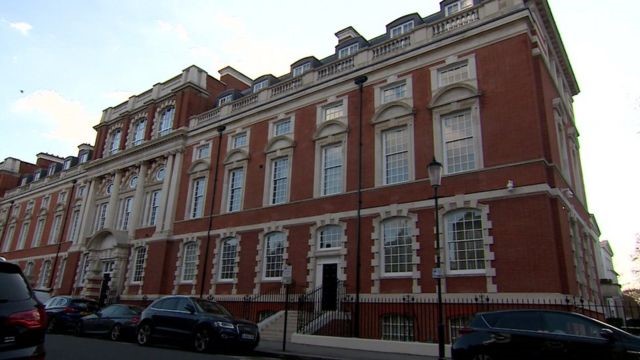
The Aliyevs’ super-apartment in Chelsea, worth over $50 million[68]
Half of Kazakhstan’s wealth is concentrated in the hands of just 200 people – a typical figure for countries born out of the explosion of the Soviet Union[69]. 97% of the population earns less than $10,000 a year, while the world average is 65% and the average in the West is 29%[70]. Because of the almost non-existent domestic demand, and for security reasons, Kazakh millionaires emigrate – mainly to London[71]. According to the Chatham House Institute, Kazakhstan’s ruling elite bought 35 properties worth £530 million in the UK between 1998 and 2002[72], generally using offshore companies[73]. Between 2008 and 2015, when the UK sold residence permits to generous investors, Kazakhs topped the list (in fifth place): more than 200 Kazakh millionaires obtained the right to live in the country and acquire citizenship (including Mukhtar Ablyazov’s son)[74].
Nevertheless, in recent years, a small middle class has emerged in Kazakhstan, so the government has decided to take measures to actively support the development of small and medium-sized enterprises[75]. For decades, Nazarbayev has promised the people prosperity, but he has not kept his promise, because the wealth has not been redistributed fairly. The country depends on the export of raw materials, and thus on fluctuating demand in China and Russia – a fluctuation that has led to several increasingly worrying phases of devaluation, especially after the Russian rouble collapsed following the sanctions imposed by the international community for the invasion of Crimea[76].
Kazakhstan’s wealth comes mainly from the Caspian Sea. Over the years, the government has set up several companies to exploit the deposits or trade in oil products, the most important of which is Kazmunaigas[77]. These companies are almost always junior partners of foreign multinationals, which cover 75% of the industrial capital investments related to the exploitation of hydrocarbons[78]. The State controls the three large refineries of Pavlodar, Shymkent and Atyrau, which have a capacity of around 20 million tonnes of oil per year[79]. In addition, the Kashagan field, discovered in 2000, will make Kazakhstan one of the top five oil producers in the world, as will the Kurmangazy and Aral Sea fields[80].
But the Caspian Sea does not belong to Kazakhstan alone: in April 2002, the leaders of Russia, Kazakhstan, Turkmenistan, Azerbaijan and Iran met in Ashgabat and began to negotiate the division of the fields – a very difficult task, because we are talking about one third of the world’s reserves[81]. The Caspian Sea alone has more oil than Iraq and Kuwait[82]. In the end, a bilateral agreement was reached with Russia: the three border fields (Kurmangazy, Khvalynskoye and Tsentralnoye) are split down the middle[83]. In the meantime, there are more than 50 companies from around the world that have a licence to exploit Kazakh fields[84], including the Moscow giants, Lukoil and Rosneft[85].
This agreement has paved the way for an oil pipeline linking Kazakh refineries to China and one, the Baku-Tbilisi-Ceyhan, which is now blocked because it is sponsored by the United States and, in this climate of tension on the border with Ukraine, is no longer welcome[86]. Otherwise the battle is on: Chevron, ENI, Exxonmobil and Total have a significant share in the Kazakh oil industry[87]. Chevron and Exxon are cooperating with the state oil company Kazmunaigaz on the shores of the Caspian Sea: total oil production will be increased by 2024 with an investment of 45 billion dollars[88].
But the top two foreign investors in Kazakhstan are the Netherlands (Shell) and the United States, with an annual volume of $2.1 billion[89]. Washington was the first, in 1991, to recognise Kazakhstan’s independence, and Almaty reciprocated by offering its bases in support of the evacuation of Americans from Afghanistan[90]. In early January, President Biden was among the first to hail the uprisings as a demonstration of the Kazakhs’ desire for freedom and democracy[91].
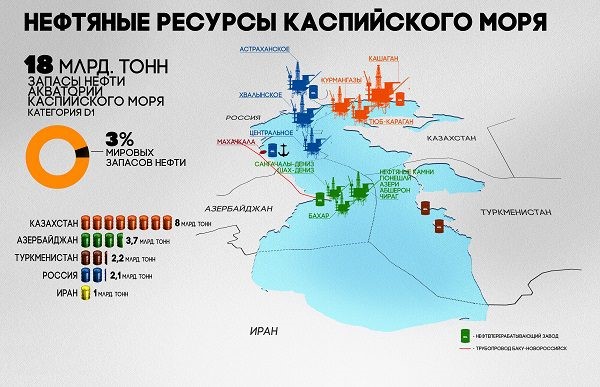
Oil map of Kazakhstan and the other Caspian Sea countries[92]
Nazarbayev has also invested in relations with China which, over the last 15 years, as part of its gigantic Silk Road project, has spent 28.5 billion dollars in Kazakhstan[93], in exchange for which the Almaty government has given up complaining about the persecution of Kazakh and Uighur Muslims on both sides of the border between the two countries[94] and has sold hydrocarbons worth over 10 million tonnes a year[95]. During the uprising, Beijing was extremely cautious, limiting itself to confirming the friendship between the two peoples and hoping for a rapid solution and stabilisation of the country’s problems[96].
China imports more coal from Kazakhstan every year: the world’s second largest economy is heavily dependent on this resource – more than half of China’s electricity is generated by coal[97]. When, in 2021, Kazakhstan found itself unable to deliver due to rising fuel prices, China raised its purchase price, unilaterally covering the increased costs[98].
The people of Kazakhstan, even if they do not know these figures precisely, know very well that they have a priceless treasure under the ground, and have so far been willing to accept the tyranny of the Nazarbayevs while waiting for the day when, at last, the need to stabilise the economy by promoting domestic demand for consumption and, therefore, general welfare, Until one day a minister, in his habit of acting autocratically, made the mistake that led the whole system to chaos…
The revolt
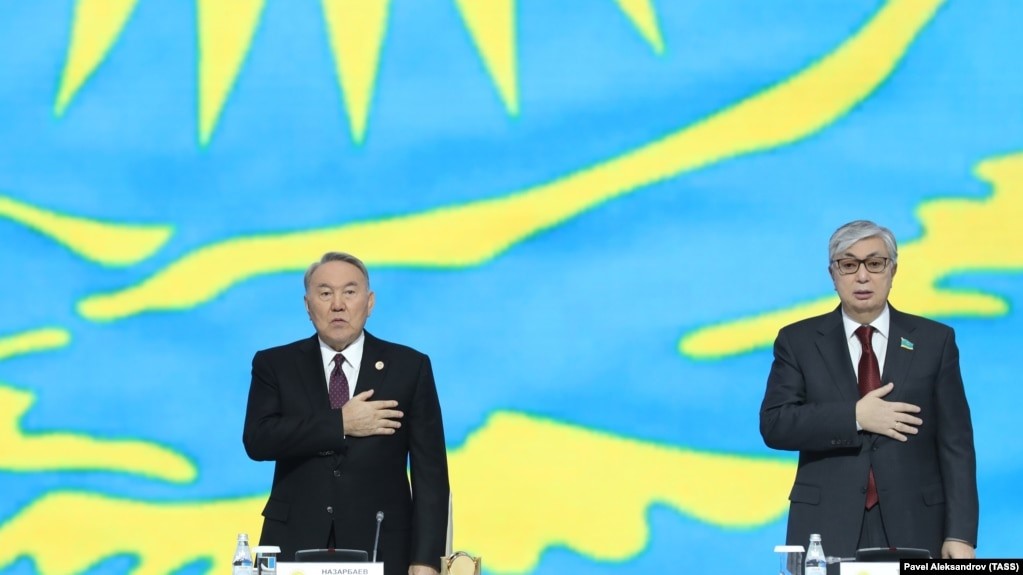
Nursultan Nazarbayev and Kassym-Zhomart Tokayev at the congress of the governing party Nur Otan[99]
On 1 January 2022, Prime Minister Askar Mamin decided to double the price of fuel, from 60 tenge to 120 tenge per litre[100] (more or less 0.28 US dollars), mockingly announcing: ‘If you go to the petrol stations, you will see for yourself’[101]. On 2 January, the inhabitants of Zhanaozen and Aktau took to the streets, and like an ocean wave, the protests spread to Almaty, Aktobe, Karaganda, Nur-Sultan, Shymkent, Kokshetau and Uralsk[102].
At first, the protesters were just asking for lower diesel prices, but this was the last straw: the people on the streets were demanding constitutional reforms, higher wages and better working conditions in the mines, then they unleashed years of anger, and suddenly the cities were full of furious people shooting, burning and looting[103]. The government soon realised that, on the wave of spontaneous protests, there were forces preparing to attempt a coup – too many weapons and professional militias, too many security guards murdered in the streets and mutilated in order to frighten the entire population[104].
On 4 and 5 January, in Almaty, there are clashes between the army and insurgents, the internet is blocked[105] and some television channels have stopped broadcasting. A state of emergency was imposed until 19 January[106]. The presidential decree also provides for a curfew from 11pm to 7am and a ban on mass demonstrations[107]. The government promised a reduction in the price of gas, but this was not enough to calm the crowds: in Aktau, protesters demanded a meeting with the president, and everywhere else the government was asked to step down and improve the quality of life[108].
On 5 January 2022, President Kassym-Jomart Tokayev dissolved the government[109] and threatened the “financially motivated” protesters[110]. He vows to use an iron fist, and in a televised speech he declares himself head of Kazakhstan’s Security Council, the position reserved for life for the ‘father of the nation’[111]. On 19th January, the Majilis cancelled Nazarbayev’s[112] privileges and closed the airports[113]. Protesters set fire to the Almaty city hall, there were clashes and vandalism everywhere, and in a few hours over 500 people were injured[114]. In the meantime, Tokayev gave orders to the police and army to shoot[115] at ‘criminals and murderers’ organised by ‘foreign entities’[116]. In this way Tokayev completed a real coup d’état[117].
On the morning of 7th January, the figures of the riots were counted: 3000 arrested (3800 according to other sources) and 26 armed bandits killed[118], 18 police officers killed, two of them beheaded[119]. The protests died down and the airports reopened: the Russian Defence Ministry reported that Russian peacekeepers, together with Kazakh security forces, had taken control of Almaty airport, ATMs were distributing money and shops were open and stocked with food[120].
During and after the uprising, Nazarbayev disappeared – which reinforced the impression that the spontaneous unrest was used for an internal settling of accounts within the regime[121]. According to witnesses, Nazarbayev fled in a National Guard Embraer E35L to Dubai, where his family owns real estate[122]. He was only seen on TV on 18 January, when it was all over[123]. Four minutes in which he claimed he had not noticed anything, that he had been on holiday at the seaside, and that he accepted that power had passed into Tokayev’s hands[124].
The invasion
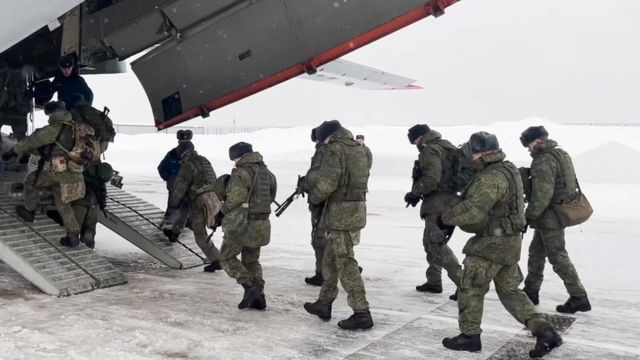
Russian military sent to Kazakhstan as part of CSTO mission[125]
Tokayev’s power is evidently directly supported by Moscow. As early as 5 January, Tokayev announced that he had asked for help from his allies in the CSTO (Collective Security Treaty Organisation)[126], a military bloc comprising Armenia, Belarus, Kyrgyzstan, Russia and Tajikistan[127], and the SHOS (Shanghai Cooperation Organisation), comprising Russia, China, Kyrgyzstan, Kazakhstan, Tajikistan and Uzbekistan, with Iran, Mongolia, Pakistan and India as observers[128]. The CSTO responded by immediately sending 2500 troops[129].
These were the 45th Airborne Brigade (VDV), an elite corps of the Russian army[130]. Soldiers from this unit participated in the first and second wars in Chechnya, the Russian-Georgian war in 2008, the Russian operation to annex Crimea in 2014 and the war in Syria[131]. As the unrest had spread to other cities, Moscow also sends the 98th Airborne Division – another special unit engaged in Bosnia and Herzegovina in 1996, in the Georgian-Abkhazian conflict zone in 1998, in Kosovo in 1999 and, in 2014, in eastern Ukraine, where they participated in the battle of Donbass[132]. Still not enough. The Kremlin is also sending to Kazakhstan the 31st assault brigade, called Ulyanovsk, which also specialises in espionage operations[133].
The reason is clear: Moscow must prevent Kazakhstan from falling into the orbit of the West or China[134]. Political observer Marat Bashirov explained that Putin has used the Kazakh unrest to show the West where the impassable limits are: “Western colleagues wanted to test how firm the Kremlin is in defending its interests and they were shown this firmness”[135]. It is not just a question of the Baikonur base and the oil fields: Kazakhstan is part of the customs union of the Russian Federation, and is therefore a country with limited sovereignty[136]. Added to this is Kazakhstan’s uranium production (19,000 tonnes per year, 41% of global production)[137].
Putin succeeded in a much more important move: not only Russian troops marched into Kazakhstan, but also the most important troops of other countries that were formerly part of the Soviet Union – such as the Belarusians of the 103rd Airborne Brigade Vitebsk – a unit that fought against the Nazis in World War II. It participated in the invasion that ended the Prague Spring in 1968 and was stationed in Afghanistan between 1979 and 1989[138], but also took part in a peace mission in Lebanon[139].
Together with them, the 12th Armenian Brigade was deployed in Kazakhstan[140], which has taken part in many international peacekeeping missions, and its deployment created a wave of discontent at home, given that, in 2021, when Nagorno-Karabakh was attacked by the Azeris, the CSTO had not come to Armenia’s aid, but that of its enemies[141]. Chechen leader Ramzan Kadyrov recorded an appeal on TV, halfway between an exhortation and a threat, to convince the Kazakhs to return home[142]. Even Turkey, through the mouth of defence minister Hulusi Akar, said it was ready to leave: “Whenever there is a request… we are ready to provide all the help and support we can to our Kazakh brothers and sisters[143]. Tokayev thanked everyone, but especially Putin[144], of course – because the direction of this ‘soft’ coup is certainly his.
After the storm
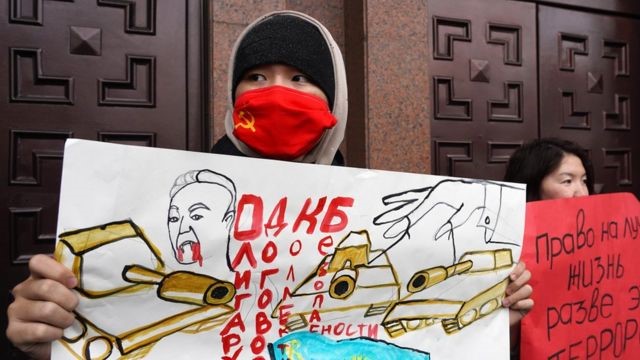
Bishkek: pickets in front of the parliament against sending Kyrgyz peacekeepers to Kazakhstan[145]
Since Tokayev took power, only eight out of 21 ministers have been replaced[146], and these are always politicians who have made their careers with the Nazarbayev family[147]. The new president emphasised that much of the responsibility for the unrest lay with the state oil industry (KazMunaiGas and KazakhGas) and its uneconomic management: ‘Nobody can constantly sell at a loss. The country can remain without investment in the gas and gas processing industry and, consequently, without gas. That is why we cannot do without systematic reforms”[148].
The new names sought by Tokayev are the head of the cabinet, Galymzhana Koishybaeva, the minister of trade, the minister of information, the minister of health, the minister of industry, the minister of culture, the minister of economy and the minister of energy[149]. The rationale is obvious: there is a need to extend prosperity and therefore to aim for a change in economic and cultural direction. The new prime minister, Alikhan Smailov, is one of those whom Nazarbayev had chosen as his successor[150]. But the most important changes wanted by Tokayev are elsewhere: the top military, police and secret services[151]. Nazarbayev’s relatives are leaving quietly: Dimash Dosanov, president of KazTransOil (husband of Aliya Nazarbayeva), and Kairat Sharipbayev, president of Kazakhgaz (and lover of Dariga Nazarbayeva), were fired, and on 17 January the billionaire Timur Kulibayev also gave up all his public duties[152].
An attempt is being made to return to apparent normality as soon as possible: foreign troops left Kazakhstan in less than two weeks[153]; Almaty and other centres affected by the unrest will be rebuilt as soon as possible[154]. The reform of the security forces has begun, and salary increases have also been promised to the military and police[155]. And now, the times are come, Nazarbajev should be forgotten: “Thanks to Yelbasy, a group of companies and a class of people have achieved wealth, even by international standards,” says Tokayev, but adds that now “it is time to pay tribute to the people of Kazakhstan and help them in a systematic way”[156]. by forcing companies and the wealthy to participate in a fund that would serve to emancipate the Kazakh people from poverty and uncertainty[157].
It is necessary to revise the rules of the Development Bank of Kazakhstan which, ‘in fact, has turned into a personal bank for a small circle of individuals representing financial, industrial and real estate groups’[158]. The salaries of politicians will be frozen, those of public administration employees will be increased – a measure that should help to decrease corruption[159]. All promises that the population sees as a ‘breath of fresh air’ and a reason for renewed optimism[160].
A possible future
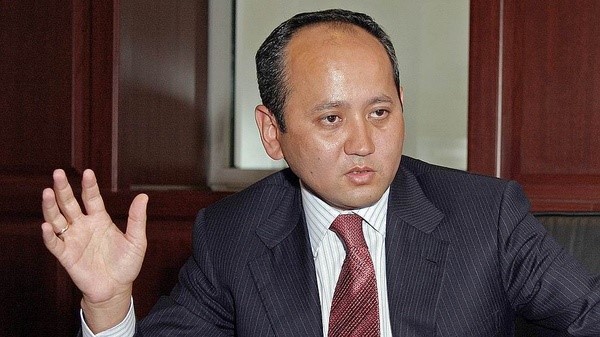
Mukhtar Ablyazov[161]
Tokayev needs not only Russian support, but also the tacit consent of Nazarbayev. His power is still weak, and there are still many people who could try to take it away from him. First of all Mukhtar Ablyazov, former president of the BTA Bank, at first a protégé and then an opponent of the regime, who in 2015 founded his own party, the DCK (Democratic Choice of Kazakhstan), until now considered almost a terrorist organisation[162]. Today, of course, DCK is running to change the country and put a peaceful end to the ‘Nazarbayev regime[163]‘.
Ablyazov fled the country when the BTA was nationalised in 2009, feeling threatened. In 2011 he was granted political asylum in the UK[164], which was revoked when he refused to account for his assets and fled to France[165]. Fraud charges of more than $6 billion hang over his head and[166], in June 2017, he was sentenced in absentia to 20 years in prison in Almaty[167]. From his voluntary exile in Paris, Ablyazov lets it be known that, if the people want him, he is ready to return to Kazakhstan and take over the reins of government[168] and calls Nazarbayev and Tokayev “traitors to the nation who sold Kazakhstan’s sovereignty to Putin”[169].
The chairman of the Duma committee, Leonid Kalashnikov, calls for Ablyazov to be tried as the organiser of the riots, calls him mentally disturbed[170], and then expresses a severe judgment: “There are many such people in London and Paris, who think they are people who lead the opposition. Ablyazov, who has been on trial for many years, is one of them. He has decided to participate in these protests. If he is not a frontrunner, but actually finances in the shadows, all the sadder. We know what happened in Almaty. A gang of pogromists was rampant, distributing weapons. If he is involved in this, he is also a terrorist. He must be arrested immediately[171]. Another possible candidate is Nazarbayev’s eldest daughter – Dariga, a woman who has been active in politics for years and enjoys excellent relations in the upper echelons of Russian and Chinese power[172]. The fact remains that it will not be the people who elect their leaders, but a restricted oligarchy that will decide the rules and positions of the men in office.
The fact remains that, in a sudden and unexpected way, Kazakhstan has put three decades of absolute autocratic power behind it and is now, without any apparent serious injuries, simply changing course and reassuring the population (it has been repeatedly announced that all the wounded have been treated, that there will be no mass round-ups of opponents and that only those caught red-handed in the devastation or the murders of individual policemen will be punished), managing not to quarrel with any of his international partners, and without interrupting, even for a second, the work of the oil industry. In this sense, Putin has performed a masterpiece – because he has safeguarded the independence of Kazakhstan and has not entered with his tanks and then stayed, as he threatens to do in Belarus and Ukraine.
[1] https://www.etymonline.com/word/Cossack
[2] Michal Biran. The Empire of the Qara Khitai in Eurasian History: Between China and the Islamic World”, Cambridge University Press, 2005. P.96; Sadovskaya, Elena Y. (2007), Chinese Migration to Kazakhstan: a Silk Road for Cooperation or a Thorny Road of Prejudice?, China and Eurasia Forum Quarterly Т. 5 (4): 147–170 ; https://books.google.it/books?id=B934LaVBaz8C&pg=PA96&redir_esc=y#v=onepage&q&f=false ; https://vlast.kz/obsshestvo/kitajskaja_migracija_v_kazahstan_mify_i_strahi-7846.html
[3] https://countrymeters.info/ru/Kazakhstan
[4] https://stat.gov.kz/region/268020
[5] https://kazembassy.ru/rus/respublika_kazakhstan/interesnoe_o_kazaxstane/turizm/?cid=0&rid=51
[6] https://kazembassy.ru/rus/respublika_kazakhstan/obshaya_informaciya/
[7] https://www.bbc.com/russian/features-59898508
[8] https://eurasianet.org/kazakhstan-russia-to-keep-using-baikonur-until-at-least-2050
[9] https://kazembassy.ru/rus/respublika_kazakhstan/interesnoe_o_kazaxstane/baikonur/
[10] https://www.msn.com/de-de/finanzen/top-stories/aufst%C3%A4nde-was-die-unruhen-in-kasachstan-f%C3%BCr-russland-china-und-die-usa-bedeuten/ar-AASvFBA?ocid=msedgntp
[11] http://www.baikonuradm.ru/index.php?mod=6543
[12] https://kazembassy.ru/rus/respublika_kazakhstan/interesnoe_o_kazaxstane/baikonur/
[13] Sadovskaya, Elena Y. (2016), China’s Rise in Kazakhstan and Its Impact on Migration. Research Paper. MIRPAL, Regional Migration Program by the World Bank, IOM, UN Women, DFID. Almaty-Moscow. 120 p ; https://vlast.kz/obsshestvo/kitajskaja_migracija_v_kazahstan_mify_i_strahi-7846.html
[14] Parham, Stephen (2004), Narrating the Border: The Discourse of Control over China’s Northwest Frontier, vol. 25, Arbeitsblatt, Institut fur Ethnologie, Universitat Bern
[15] Sadovskaya, Elena Y. (2016), China’s Rise in Kazakhstan and Its Impact on Migration. Research Paper. MIRPAL, Regional Migration Program by the World Bank, IOM, UN Women, DFID. Almaty-Moscow. 120 p ; Parham, Stephen (2004), Narrating the Border: The Discourse of Control over China’s Northwest Frontier, vol. 25, Arbeitsblatt, Institut fur Ethnologie, Universitat Bern
[16] https://rus.azattyq.org/a/kazakhstan-ethnic-kazakhs-repatriates-from-china-are-becoming-less-why/31283689.html
[17] https://rus.azattyq.org/a/kazakhstan-ethnic-kazakhs-repatriates-from-china-are-becoming-less-why/31283689.html
[18] https://rus.azattyq.org/a/kazakhstan-ethnic-kazakhs-repatriates-from-china-are-becoming-less-why/31283689.html
[19] https://rus.azattyq.org/a/kazakhstan-us-state-department-human-rights-report/29820496.html ; https://rus.azattyq.org/a/kazakhstan-vypolnenie-deklaratsii-prav-cheloveka-v-kazakhstane/29646432.html
[20] https://www.europarl.europa.eu/news/it/press-room/20191212IPR68927/la-cina-deve-chiudere-i-campi-di-rieducazione-per-gli-uiguri-nello-xinjiang
[21] https://www.europarl.europa.eu/news/it/press-room/20191212IPR68927/la-cina-deve-chiudere-i-campi-di-rieducazione-per-gli-uiguri-nello-xinjiang
[22] https://kazembassy.ru/rus/respublika_kazakhstan/interesnoe_o_kazaxstane/baikonur/
[23] http://content.time.com/time/world/article/0,8599,1539999-2,00.html
[24] http://content.time.com/time/world/article/0,8599,1539999-2,00.html
[25] http://content.time.com/time/world/article/0,8599,1539999,00.html
[26] https://rus.azattyq.org/a/kazakhstan-vypolnenie-deklaratsii-prav-cheloveka-v-kazakhstane/29646432.html ; https://www.hrw.org/ru/world-report/2020/country-chapters/336554
[27] http://content.time.com/time/world/article/0,8599,1539999,00.html
[29] https://kursiv.kz/news/politika/2019-03/tokaev-vstupil-v-dolzhnost-prezidenta-kazakhstana
[30] https://www.hrw.org/ru/world-report/2020/country-chapters/336554
[31] https://old.qazaqtv.com/ru/category/economy
[32] https://e-history.kz/ru/history-of-kazakhstan/show/9352/
[33] https://www.bbc.com/russian/features-59898508
[34] https://tass.ru/info/6234442
[35] https://tass.ru/info/6234442
[36] https://www.occrp.org/en/investigations/the-nazarbayev-billions-how-kazakhstans-leader-of-the-nation-controls-vast-assets-through-charitable-foundations
[37] https://tass.ru/info/6234442
[38] https://www.occrp.org/en/investigations/the-nazarbayev-billions-how-kazakhstans-leader-of-the-nation-controls-vast-assets-through-charitable-foundations ; https://tass.ru/info/6234442
[39] https://elbasy.kz/ru/semya
[40] https://www.forbes.ru/biznes/452013-kak-byvsij-oligarh-muhtar-ablazov-prevratilsa-v-lidera-protestov-v-kazahstane
[41] https://forbes.kz/ranking/object/40
[42] https://online.zakon.kz/Document/?doc_id=30095276
[43] https://www.bbc.com/russian/media-59919351
[44] https://ria.ru/20220127/kazakhstan-1769721818.html
[45] https://www.occrp.org/en/investigations/the-nazarbayev-billions-how-kazakhstans-leader-of-the-nation-controls-vast-assets-through-charitable-foundations
[46] https://ria.ru/20150224/1049337195.html
[47] https://rus.azattyq.org/a/Krestny_test_Rakhat_Aliev/1663602.html
[48] https://rus.azattyq.org/a/Krestny_test_Rakhat_Aliev/1663602.html
[49] https://ria.ru/20150224/1049337195.html
[50] https://ria.ru/20150224/1049337195.html
[51] https://tsargrad.tv/news/zhurnalist-raskryl-vsju-pravdu-o-lichnoj-tragedii-nazarbaeva-nashli-poveshennym_475552
[52] https://rus.azattyq.org/a/kazakhstan-tokaev-kotory-oboshel-soglashenie-s-nazarbaevymi-usilivshiy-svoe-vliyanie-regione-putin/31655390.html
[53] https://forbes.kz/ranking/object/40
[54] https://www.telegraph.co.uk/world-news/2022/01/08/kazakh-despots-daughter-went-london-spending-spree-moving-300m/
[55] https://www.bbc.com/russian/news-53799146
[56] In The High Court Of Justice Queen’s Bench Division Administrative Court Between National Crime Agency (NCA) And Andrew Baker, Villa Magna Foundation, Manrick Private Foundation, Alderton Investments Limited, Tropicana Assets Foundation: Respondents’ Skeleton Argument (From here, ‘NCA V Baker. RSA’), para 4. ; https://www.chathamhouse.org/sites/default/files/2021-12/2021-12-08-uk-kleptocracy-problem-heathershaw-mayne-et-al.pdf p. 30
[57] https://amp.dw.com/ru/%D1%80%D0%B0%D1%85%D0%B0%D1%82-%D0%B0%D0%BB%D0%B8%D0%B5%D0%B2-%D0%BF%D1%80%D0%B8%D0%B7%D0%BD%D0%B0%D0%BD-%D1%81%D1%83%D0%BF%D0%B5%D1%80%D0%BF%D1%80%D0%B5%D1%81%D1%82%D1%83%D0%BF%D0%BD%D0%B8%D0%BA%D0%BE%D0%BC/a-3218144 ; https://rus.azattyq.org/a/ex-opponenty-rakhata-aliyeva-ne-veryat-v-ego-samoubiistvo/26866335.html
[58] https://www.bbc.com/russian/news-51746068
[59] https://www.bbc.com/russian/features-59898508
[60] https://www.bbc.com/russian/news-53799146
[61] https://www.bbc.com/russian/news-53799146
[62] https://www.occrp.org/en/investigations/the-nazarbayev-billions-how-kazakhstans-leader-of-the-nation-controls-vast-assets-through-charitable-foundations ; https://www.currenttime.tv/a/ot-miss-kazahstan-i-tantsovschitsy-do-zheny-nazarbaeva-kto-takaya-asel-kurmanbaeva/31494124.html
[63] https://www.currenttime.tv/a/vtoraya-zhena-nazarbaeva-zarabotala-30-mln/31491657.html
[64] https://www.occrp.org/en/the-pandora-papers/secretive-offshore-maneuvers-enriched-unofficial-third-wife-of-kazakhstani-leader-nursultan-nazarbayev
[65] https://rus.azattyq.org/a/Vladimir_Kim_Kazakhmys_Vladimir_Ni/2177516.html
[66] https://www.occrp.org/en/investigations/the-nazarbayev-billions-how-kazakhstans-leader-of-the-nation-controls-vast-assets-through-charitable-foundations
[67] https://www.occrp.org/en/investigations/the-nazarbayev-billions-how-kazakhstans-leader-of-the-nation-controls-vast-assets-through-charitable-foundations ; https://istories.media/investigations/2022/01/19/milliardi-nazarbaeva-kak-kazakhskii-lider-natsii-kontroliruet-obshirnie-aktivi-cherez-blagotvoritelnie-fondi/
[68] https://www.bbc.com/russian/news-51746068
[69] https://assets.kpmg/content/dam/kpmg/kz/pdf/2019/09/KPMG-Private-Equity-Market-in-Kazakhstan-ENG-2019.pdf ; Global Wealth Report 2021: https://www.credit-suisse.com/about-us/it/reports-ricerca/studi-pubblicazioni.html
[70] https://assets.kpmg/content/dam/kpmg/kz/pdf/2019/09/KPMG-Private-Equity-Market-in-Kazakhstan-ENG-2019.pdf
[71] https://www.bbc.com/russian/features-59898508
[72] https://rus.azattyq.org/a/kazakhstan-tokaev-kotory-oboshel-soglashenie-s-nazarbaevymi-usilivshiy-svoe-vliyanie-regione-putin/31655390.html
[73] https://www.chathamhouse.org/sites/default/files/2021-12/2021-12-08-uk-kleptocracy-problem-heathershaw-mayne-et-al.pdf p. 51
[74] https://www.chathamhouse.org/sites/default/files/2021-12/2021-12-08-uk-kleptocracy-problem-heathershaw-mayne-et-al.pdf p. 15, 16
[75] https://assets.kpmg/content/dam/kpmg/kz/pdf/2019/09/KPMG-Private-Equity-Market-in-Kazakhstan-ENG-2019.pdf
[76] https://www.bbc.com/russian/features-59898508
[77] https://old.qazaqtv.com/ru/category/economy
[78] https://old.qazaqtv.com/ru/category/economy
[79] https://old.qazaqtv.com/ru/category/economy
[80] https://old.qazaqtv.com/ru/category/economy
[81] https://www.nkj.ru/archive/articles/5119/
[82] https://neftok.ru/strany/kaspij-neft.html
[83] https://www.nkj.ru/archive/articles/5119/
[84] https://neftok.ru/strany/kaspij-neft.html
[85] https://www.msn.com/de-de/finanzen/top-stories/aufst%C3%A4nde-was-die-unruhen-in-kasachstan-f%C3%BCr-russland-china-und-die-usa-bedeuten/ar-AASvFBA?ocid=msedgntp ; https://neftok.ru/strany/kaspij-neft.html
[86] http://content.time.com/time/world/article/0,8599,1539999-2,00.html
[87] https://old.qazaqtv.com/ru/category/economy
[88] https://www.msn.com/de-de/finanzen/top-stories/aufst%C3%A4nde-was-die-unruhen-in-kasachstan-f%C3%BCr-russland-china-und-die-usa-bedeuten/ar-AASvFBA?ocid=msedgntp
[89] https://www.msn.com/de-de/finanzen/top-stories/aufst%C3%A4nde-was-die-unruhen-in-kasachstan-f%C3%BCr-russland-china-und-die-usa-bedeuten/ar-AASvFBA?ocid=msedgntp
[90] https://www.msn.com/de-de/finanzen/top-stories/aufst%C3%A4nde-was-die-unruhen-in-kasachstan-f%C3%BCr-russland-china-und-die-usa-bedeuten/ar-AASvFBA?ocid=msedgntp
[91] https://www.msn.com/de-de/finanzen/top-stories/aufst%C3%A4nde-was-die-unruhen-in-kasachstan-f%C3%BCr-russland-china-und-die-usa-bedeuten/ar-AASvFBA?ocid=msedgntp
[92] https://neftok.ru/strany/kaspij-neft.html
[93] https://kapital.kz/economic/101161/investitsionnoye-sotrudnichestvo-kazakhstana-i-kitaya-na-tekushchem-etape.html
[94] http://www.sidiblog.org/2021/04/11/le-violazioni-dei-diritti-umani-nello-xinjiang-tra-la-reazione-della-cina-e-il-lento-risveglio-della-comunita-internazionale/ ; https://www.amnesty.it/rapporti-annuali/rapporto-2020-2021/asia-e-pacifico/cina/
[95] https://24.kz/ru/news/delovye-novosti/item/512107-kazakhstan-uvelichivaet-postavki-gaza-v-kitaj ; https://oilcapital.ru/news/export/21-01-2020/pochti-11-mln-tonn-nefti-poluchil-kitay-iz-kazahstana-v-2019-godu ; https://informburo.kz/novosti/kazahstan-voshyol-v-trojku-glavnyh-postavshikov-gaza-v-kitaj ; https://www.msn.com/de-de/finanzen/top-stories/aufst%C3%A4nde-was-die-unruhen-in-kasachstan-f%C3%BCr-russland-china-und-die-usa-bedeuten/ar-AASvFBA?ocid=msedgntp
[96] https://www.msn.com/de-de/finanzen/top-stories/aufst%C3%A4nde-was-die-unruhen-in-kasachstan-f%C3%BCr-russland-china-und-die-usa-bedeuten/ar-AASvFBA?ocid=msedgntp
[97] https://kapital.kz/world/100159/kitay-vdvoye-narastil-import-uglya.html ; https://informburo.kz/novosti/130-tysyach-tonn-kazahstanskogo-uglya-eksportirovali-v-kitaj-u-sosedej-nehvatka-topliva
[98] https://informburo.kz/novosti/130-tysyach-tonn-kazahstanskogo-uglya-eksportirovali-v-kitaj-u-sosedej-nehvatka-topliva
[99] https://rus.azattyq.org/a/politologi-o-perestanovkah-vo-vlasti-kazahstana-iz-za-protestov/31642614.html
[100] https://www.bbc.com/russian/news-59875406
[101] https://tsargrad.tv/articles/jeto-vam-ne-elbasy-lukashenko-sdelal-istoricheskoe-zajavlenie_475147
[102] https://tsargrad.tv/articles/jeto-vam-ne-elbasy-lukashenko-sdelal-istoricheskoe-zajavlenie_475147
[103] https://www.bbc.com/russian/media-59903623
[104] https://tsargrad.tv/articles/jeto-vam-ne-elbasy-lukashenko-sdelal-istoricheskoe-zajavlenie_475147
[105] https://www.bbc.com/russian/news-59875406
[106] https://ria.ru/20220107/armeniya-1766852436.html
[107] https://www.bbc.com/russian/news-59875406
[108] https://www.bbc.com/russian/news-59875406
[109] https://ria.ru/20220107/armeniya-1766852436.html
[110] https://www.bbc.com/russian/news-59875406
[111] https://www.bbc.com/russian/news-59875406
[112] https://russian.rt.com/ussr/news/950911-kazahstan-nazarbaev-sovbez
[113] https://www.bbc.com/russian/news-59875406
[114] https://www.bbc.com/russian/news-59875406
[115] https://iz.ru/1274102/2022-01-07/tokaev-dal-prikaz-otkryvat-ogon-na-porazhenie-po-terroristam
[116] https://www.bbc.com/russian/news-59906874
[117] https://www.bbc.com/russian/news-59906874
[118] https://govoritmoskva.ru/news/300974/
[119] https://iz.ru/1274102/2022-01-07/tokaev-dal-prikaz-otkryvat-ogon-na-porazhenie-po-terroristam
[120] https://www.bbc.com/russian/news-59906874
[121] https://www.bbc.com/russian/news-59906874
[122] https://www.msn.com/de-de/finanzen/top-stories/aufst%C3%A4nde-was-die-unruhen-in-kasachstan-f%C3%BCr-russland-china-und-die-usa-bedeuten/ar-AASvFBA?ocid=msedgntp
[123] https://www.youtube.com/watch?v=K0ZSwtUV_bo
[124] https://www.youtube.com/watch?v=K0ZSwtUV_bo ; https://rus.azattyq.org/a/kazakhstan-nazarbayev-social-media-review/31660117.html
[125] https://www.bbc.com/russian/features-59902799
[126] Official web-site: http://www.odkb.gov.ru/a/c.htm
[127] https://odkb-csto.org/countries/
[128] http://www.odkb.gov.ru/pr/ezp.htm#:~:text=%D0%92%20%D0%9E%D0%94%D0%9A%D0%91%20%D0%B2%D1%85%D0%BE%D0%B4%D1%8F%D1%82%20%D0%90%D1%80%D0%BC%D0%B5%D0%BD%D0%B8%D1%8F%2C%20%D0%91%D0%B5%D0%BB%D0%B0%D1%80%D1%83%D1%81%D1%8C,%2C%20%D0%A0%D0%BE%D1%81%D1%81%D0%B8%D1%8F%2C%20%D0%A2%D0%B0%D0%B4%D0%B6%D0%B8%D0%BA%D0%B8%D1%81%D1%82%D0%B0%D0%BD%20%D0%B8%20%D0%A3%D0%B7%D0%B1%D0%B5%D0%BA%D0%B8%D1%81%D1%82%D0%B0%D0%BD
[129] https://www.bbc.com/russian/features-59902799
[130] https://structure.mil.ru/structure/forces/airborne/structure/details.htm?id=11266@egOrganization
[131] https://crimea.ria.ru/20220106/v-kazakhstan-napravleny-chasti-45-y-brigady-vdv-rf-kotoraya-vozvraschala-krym-1121960698.html
[132] https://www.bbc.com/russian/features-59902799
[133] https://www.bbc.com/russian/features-59902799
[134] http://kapital.kz/economic/101377/aes-mogut-postroit-vozle-poselka-ulken-v-almatinskoy-oblasti.html ; https://www.bbc.com/russian/media-59903623
[135] https://infotime.co/2022/01/06/polittehnolog-ukazal-na-zhestkij-otvet-putina-na-protesty-v-kazahstane/?utm_medium=referral&utm_source=lentainform&utm_campaign=gru.infotime.co&utm_term=1280454s2090238455&utm_content=9909890
[136] https://rus.azattyq.org/a/kazakhstan-tokaev-kotory-oboshel-soglashenie-s-nazarbaevymi-usilivshiy-svoe-vliyanie-regione-putin/31655390.html
[137] https://www.msn.com/de-de/finanzen/top-stories/aufst%C3%A4nde-was-die-unruhen-in-kasachstan-f%C3%BCr-russland-china-und-die-usa-bedeuten/ar-AASvFBA?ocid=msedgntp
[138] https://officelife.media/news/30092-odkb-mozhet-poslat-v-kazakhstan-kontingenty-iz-rossii-i-belarusi/part4/
[139] https://officelife.media/news/30092-odkb-mozhet-poslat-v-kazakhstan-kontingenty-iz-rossii-i-belarusi/part4/
[140] https://ria.ru/20220107/armeniya-1766852436.html
[141] https://www.bbc.com/russian/features-59902799
[142] https://govoritmoskva.ru/news/300987/
[143] https://russian.rt.com/ussr/news/946823-minoborony-turciya-kazahstan
[144] https://www.bbc.com/russian/news-59906874
[145] https://www.bbc.com/russian/news-59906874
[146] https://akorda.kz/ru/o-sostave-pravitelstva-respubliki-kazahstan-110277
[147] https://amp.rbc.ru/rbcnews/politics/11/01/2022/61dd6d709a7947aa7e63410e
[148] https://www.rbc.ru/politics/05/01/2022/61d50dd99a794713429b1411
[149] https://amp.rbc.ru/rbcnews/politics/11/01/2022/61dd6d709a7947aa7e63410e
[150] https://inbusiness.kz/ru/appointment/dose-smailov-alihan-ashanovich
[151] https://rus.azattyq.org/a/politologi-o-perestanovkah-vo-vlasti-kazahstana-iz-za-protestov/31642614.html ; https://ria.ru/20220119/razvedka-1768553456.html
[152] https://www.rbc.ru/rbcfreenews/61e4e3e09a794771dbc6fc9d ; https://rus.azattyq.org/a/31658220.html
[153] https://www.rbc.ru/politics/11/01/2022/61dd2c409a79478d85baaf7c ; https://www.youtube.com/watch?v=gZCrdHevtIQ
[154] https://www.youtube.com/watch?v=gZCrdHevtIQ ; https://www.rbc.ru/politics/11/01/2022/61dd2c409a79478d85baaf7c
[155] https://www.rbc.ru/politics/11/01/2022/61dd2c409a79478d85baaf7c ; https://www.youtube.com/watch?v=gZCrdHevtIQ
[156] https://www.rfi.fr/ru/%D1%86%D0%B5%D0%BD%D1%82%D1%80%D0%B0%D0%BB%D1%8C%D0%BD%D0%B0%D1%8F-%D0%B0%D0%B7%D0%B8%D1%8F/20220111-%D1%82%D0%BE%D0%BA%D0%B0%D0%B5%D0%B2-%D0%BF%D1%80%D0%B5%D0%B4%D0%BB%D0%BE%D0%B6%D0%B8%D0%BB-%D1%80%D0%B5%D1%84%D0%BE%D1%80%D0%BC%D1%8B-%D0%B8-%D0%BD%D0%B0%D0%B7%D0%BD%D0%B0%D1%87%D0%B8%D0%BB-%D0%BD%D0%BE%D0%B2%D0%BE%D0%B5-%D0%BF%D1%80%D0%B0%D0%B2%D0%B8%D1%82%D0%B5%D0%BB%D1%8C%D1%81%D1%82%D0%B2%D0%BE-%D0%B1%D0%B5%D0%B7-%D0%BD%D0%BE%D0%B2%D1%8B%D1%85-%D0%BB%D0%B8%D1%86
[157] https://www.rbc.ru/politics/11/01/2022/61dd2c409a79478d85baaf7c
[158] https://www.youtube.com/watch?v=gZCrdHevtIQ
[159] https://www.rbc.ru/politics/11/01/2022/61dd2c409a79478d85baaf7c
[160] https://ria.ru/20220111/vystuplenie-1767378826.html
[161] https://govoritmoskva.ru/news/300993/
[162] https://rus.azattyq.org/a/29095709.html
[163] https://rus.azattyq.org/a/29095709.html
[164] https://www.reuters.com/article/uk-ablyazov-ruling-idUKBRE92I11J20130319
[165] https://www.ft.com/content/c22e50d0-c53e-11e3-89a9-00144feabdc0
[166] https://www.reuters.com/article/uk-ablyazov-ruling-idUKBRE92I11J20130319
[167] https://rus.azattyq.org/a/29095709.html
[168] https://govoritmoskva.ru/news/300969/?utm_medium=referral&utm_source=infox.sg&utm_campaign=exchange
[169] https://govoritmoskva.ru/news/300969/?utm_medium=referral&utm_source=infox.sg&utm_campaign=exchange
[170] https://govoritmoskva.ru/news/300993/
[171] https://govoritmoskva.ru/news/300993/
[172] https://tsargrad.tv/news/zhurnalist-raskryl-vsju-pravdu-o-lichnoj-tragedii-nazarbaeva-nashli-poveshennym_475552
Leave a Reply